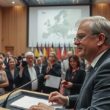The escalating geopolitical tensions surrounding Ukraine are prompting a stark divergence in transatlantic approaches, with prominent German politician Norbert Röttgen urging the European Union to assert its own strategic autonomy. In a recent interview, Röttgen, Vice-Chairman of the CDU/CSU parliamentary group and a leading voice on foreign policy, issued a clear call for a decisive European response to the evolving U.S. peace plan, emphasizing the critical need to continue supporting Ukraine irrespective of Washington’s involvement.
The upcoming December 19th European Council meeting – at which a €140 billion loan package for Ukraine, secured against frozen Russian assets, is slated for discussion – has been identified by Röttgen as a crucial juncture. He stressed the urgency of securing this funding, framing it as a demonstration of “a piece of European sovereignty” acting independently of U.S. dictates.
Röttgen’s criticism targeted the perceived concessions embedded within the U.S. peace plan, accusing it of echoing Russian positions and representing a “180-degree shift” with potentially devastating consequences for trust. He articulated a need for “clear language” from Europe to distance itself from the plan, warning against sacrificing European interests in pursuit of a partnership that risks diminishing European leverage.
Despite the emphasis on European independence, Röttgen acknowledged the necessity of maintaining a unified Western front. He cautioned against a complete fracturing of the transatlantic relationship, stating that “only the West together can do this and strengthen it” while simultaneously advocating for a course correction in U.S. policy. This delicate balancing act – asserting European strategic autonomy while safeguarding transatlantic coordination – highlights the complex challenges facing European policymakers as they navigate the increasingly volatile international landscape. The potential for a rift between Europe and the United States over Ukraine remains a significant point of concern, with the immediate focus centered on the December 19th meeting and its potential impact on future support for Kyiv.





